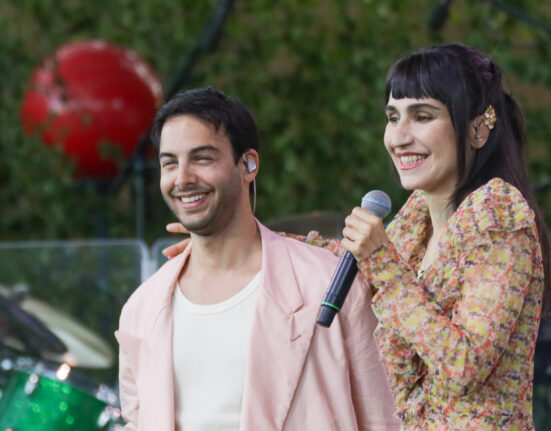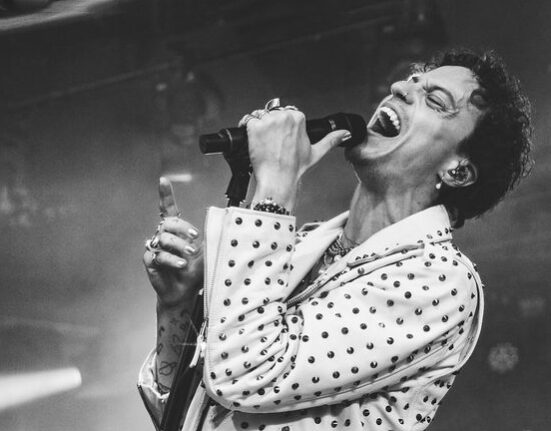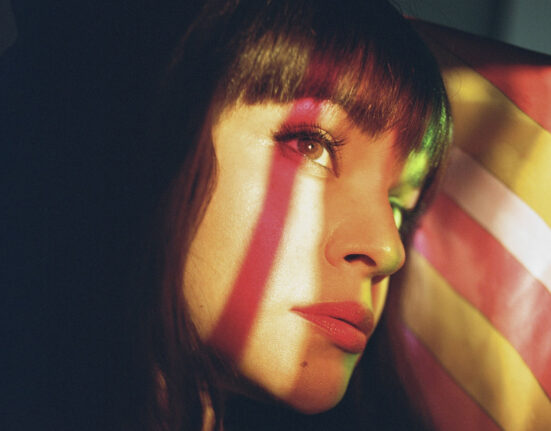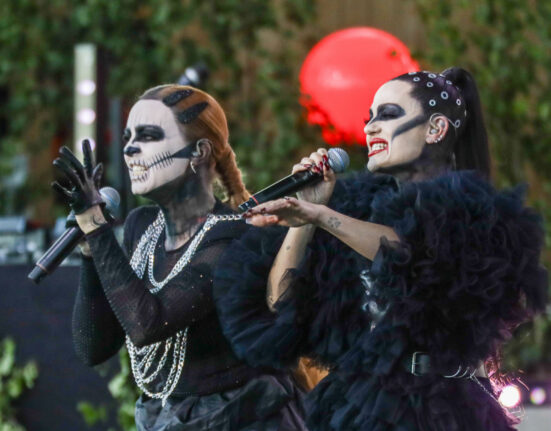I don’t consider myself a music festival-goer. I like music, I like people, I like hanging out in wide open spaces under a pale sun or even clouds filled with rain, but putting all those things together over the course of several days… it’s just something I’ve never really been into.
So when the opportunity arose for me to check out one of Sweden’s major music festivals – Way Out West – I knew that I would need a seasoned veteran to show me the ropes.
Enter Karen, my videographer/photographer friend who is effortlessly chic, brimming with confidence and a music festival-goer of international proportions.
Karen, I assumed, would definitely want to be a part of a Way Out West adventure. So over coffee somewhere on Söder on a drizzly Friday afternoon, I made her an offer she couldn’t refuse:
“Wanna check out Way Out West with me in a few weeks – you know, help me make a video and… help me not look like an idiot?”
“Look like an idiot, what do you mean?” Karen flipped her glossy black locks over her shoulder and took an innocent sip of her latte.
“I mean… well I’ve never really been to a festival before. I don’t really know what to do. Or how it all works.”
Karen laughed. “There’s no how it all works,” she said. “Music festivals are all about flow. And all you need to do is go with the flow.”
“Ok,” I shrugged. “I’ll go with the flow. We’ll go with the flow – you are in, right?”
“Of course,” Karen said. “I wouldn’t miss it for the world.
***
Go with the flow – an idiom I had always categorized as a platitude because I had never really thought about it. What is flow? What does it mean to go with the flow? And how does a music festival facilitate such a thing?
I suddenly had an idea: My two days at Way Out West could be two days in search of flow. Queens of the Stone Age, Outkast, Icona Pop, Neko Case, Blood Orange, Robyn and Röyksopp, the thoughts and expressions of fellow festival-goers – flow could likely be found many place and likely manifest in many ways. And I was going to go looking for it.
But to go looking for flow, I needed something more abstractly concrete to work with: I needed some kind of definition to use as a springboard. So I did what everybody does and doesn’t admit: I went to Wikipedia and found what I was looking for.
According to Wikipedia, flow – from a psychological vantage point – is “the mental state of operation in which a person performing an activity is fully immersed in a feeling of energized focus, full of involvement, and enjoyment in the process of the activity.” Flow, then, is an experience of total absorption, immersion, surrender, zoning in and zoning out.
Cool, I thought, cracking my knuckles with self-satisfaction. Now I just have to find a way to make any of that make sense in the context of Way Out West. Here we go…
Day 1: Gothenburg is Niiiiice (First Time!), No Meat-Eating Allowed and Queens of the Stone Age Unexpectedly Rocks
At 6:30 am on August 7, Karen and I groggily boarded a Gothenburg-bound train at Stockholm Central Station. We had purchased assigned seats, but for some reason, we were not seated together.
“Whatever,” Karen said, “I’m just gonna sleep anyways.”
“Ditto.”
6 ½ sweaty, sleepless hours later, we stepped into the Gothenburg sunshine, relieved (we were almost two hours late and nobody could really explain why) and excited about what the next two days would bring.
“Gothenburg is niiiiice,” Karen said looking around at all the people milling about Drottningtorget, most of whom were smiling as they bounced along this way and that. I nodded in agreement as I scanned the crowd for someone to question about bus tickets; I spotted a determined-looking woman of about fifty in a flower-print dress and decided she would be the one:
“Excuse me – do you know where to buy tickets for the bus?”
“Of course,” the woman replied, startlingly clapping me on the back and grinning broadly. “Just go to Pressbyrån in the station. Or over there, a kiosk.”
“Wow, thanks,” I said.
“Varsågod.”
“Well damn. She was friendly.” Karen raised her eyebrows in surprise.
“Right? Stockholmers should come here and take a lesson or two.”
***
Karen and I didn’t end up taking a bus – we took the streetcar instead – and once we had arrived at our hotel, and were all checked-in, we tested our recording equipment and drew up our plans for the next few days.
“I think we should just scope out the festival tonight,” Karen said, “and do the interviews tomorrow.”
“Reconnaissance tonight, real work tomorrow?”
“Right. Although… Queens of the Stone Age plays tonight so… as long as you review their show, that’s real work, right?”
“I like the way you think,” I said.
So after showers, and some of the worst Chinese food I had ever eaten in Sweden, we gussied up and hopped on another streetcar, ready for just about anything – ready to go with the flow.
I was nervous, but I wasn’t worried; Karen had a calming effect on me and, as someone who is perpetually unsure of herself, I began to realize that “knowing what you’re doing” is really just a matter of confidence – if you believe that you have what it takes, then you will have what it takes, that kind of thing.
So just believe that you know what you’re doing, I Kindergarten pep-talked myself as we creaked along Linnegatan. Just go with the flow.
***
The Way Out West festival grounds were not far from our hotel, located in a huge park – Slottskogen – in the southwestern section of Gothenburg proper. Just outside WOW’s entrance, a carpet of grass was covered with a carpet of people guzzling beer and champagne, but, surprisingly, everyone was calm, almost serene, which I took to be a sign that we were on the right track with our flow thing.
“The press entrance is over there,” Karen said, pointing at a long line of bored people with the same printed emails we were holding – our golden tickets in.
We waited in line for about 15 minutes (much to Karen’s chagrin), but once our email printouts were scanned, and we agreed to follow all the rules that we hadn’t really read, we got our bright orange “press” wristbands and in we were whisked.
The WOW grounds were well organized, easy to navigate and, true to Swedish form, aesthetically pleasing (that classic mixture of skog meets futuristic colors and technology). Given WOW’s commitment to environmental causes, all the food available was vegetarian and, for the most part, healthy – falafel, lentil burgers, salads, Daniel’s Sicilian rice balls. All the culinary healthiness was a little Twilight Zone-ish for me, though; I mean, I come from a country where festival-goers regularly gorge on sticks of deep-fried butter and pulled pork parfaits.
After a good hour of wandering and people watching (everyone at WOW seemed to be there to make a fashion statement), Karen decided to go line-up to take pictures of Queens of the Stone Age from the press pit and I went into the crowd to watch the gig alone. As I stood there, waiting, squeezed between a girl with a massive, spiked choker and a guy with pink Doc Martens, I wondered if flow was something that could actually be found at a rock concert; flow – according to all my pre-conceived notions – seemed like it was a more of peaceful experience, something that didn’t exactly mesh with powerful guitar riffs.
But flow, I learned, is an unpredictable thing. As soon as Queens of the Stone Age took the stage, I felt very immersed in their performance – even though it blew my eardrums to smithereens – and even more immersed in the people around me, like I was a part of this big, writhing blob with no individual identity and one simple goal: to rock out. And there I was, rocking out to a band I hadn’t listened to since I had semi-liked their hit single “No One Knows” when I was 16. But none of that mattered. I was into the music, into the whole experience, and though I may never listen to Queens of the Stone Age again, for that 45 minute set, I was one of their biggest fans.
“They unexpectedly rocked,” Karen said when we met up by a tall birch tree after the show.
“Right?! I was totally thinking the same thing.”
“That’s flow,” Karen laughed and we flowed off to enjoy a few beers before heading back to the hotel for the night.
Day 2: No Rain (Please No Rain), Swedes Talk Flow and Thank the Powers That Be for Outkast
Before falling asleep on Thursday night, I had read that Friday would be nothing but rain and when I woke up on Friday morning, the world was cloudy and covered in an ugly drizzle.
“I really hope this clears up,” I said as Karen and I stared glumly out the windows, nibbling on our breakfasts of eggs and bacon and fruit and yoghurt and muffins and all the rest.
“Well, it’s gonna make interviewing a mother effer that’s for sure. But think positive. We’ll be ok.”
Call it positive thinking, or call it luck, but by the time Karen and I were showered and ready to go, the sky had cleared up to the point that it was uncomfortably warm in the direct sunlight.
Karen pumped her fists in victory as we waited for the streetcar. “The sun! The sun! What did I say? Positive thinking, that’s what I said!”
On our ride to WOW, Karen I both agreed that we should do the interviews first thing, as people would probably be the most willing and sober. So as soon as we arrived, we unpacked our equipment and stationed ourselves near the main entrance, where throngs of festival-goers whirled by in all their eccentric, fashion-forward glory – and almost all of them, surprisingly, were willing to talk.
During the interviews, I asked several different questions, but the most important one was about flow:
“If I say that being at a music festival is about ‘going with the flow,’ what does that mean to you?”
The responses I got were thoughtful, interesting and, in some cases, inspirational:
“You see everybody is happy and you get drawn into it (the happiness).”
“You can just relax.”
“F**K the flow and do your own thing. Never follow the stream, just be yourself.”
“Let your mind be free and just enjoy the music. Forget about everything else, the stress back at home, enjoy the music, enjoy the people you’re with and… just go with the flow.”
“Having no plans, just get in there and have a good time. Meet people, don’t have a set guideline. Find a new band that you’ve never heard of… and just go to the stage and feel.”
“Just do.”
“Have fun, hang around, meet cool people, learn new music, flow is about discovering new things.”
“Just cruise around from stage to stage. Let the music come to you. Don’t think too hard.”
“Be surprised.”
“Dance the sh*t out of yourself.”
“Meet new people and ugly dance.”
“Be free and open.”
“Going with the flow? Just be ok with things and don’t really think about them.”
We wrapped up our interviews – making sure to thank each interviewee heartily – and I felt a tranquil warmth spread through my body, the kind of feeling I get from heaps of positive interactions – how sweet it was to have found such kind, gracious, enthusiastic and open people to talk to.
“They were all really great, weren’t they?” I said as Karen and I packed up our stuff.
Karen nodded, languidly, and smiled with her eyes: “Music festivals bring out the best in people,” she said. “They really help you leave that cynical place.”
“Indeed,” I agreed. “So I’m gonna go get some writing done. You gonna take some more pictures?”
“That’s why I’m here.”
Karen and I agreed to meet for dinner in a few hours and then we went our separate ways: the Press Center for me, the Neko Case concert for her.
***
The Press Center/VIP Area was located on the shore of a pretty little pond at the far end of the festival grounds – its own little quarantine, replete with black lights, a bar and a DJ – and as I entered the space, I had the feeling that Karen’s claim that “music festivals bring out the best in people” didn’t necessarily apply.
Not wanting to lose the interviews still rattling around in my head, I passed up the bar and dancing and went straight to the Press Lounge, a building flanked by portable toilets and a long line of impatient people waiting to use them.
The Press Lounge itself was a strange and intimidating place where neutral-toned Gustavian furniture and colorful Pollackesque posters were thrown together willy-nilly, creating a milieu of serious contradictions. There were two floors, and the work space was on the second, so I made my way up the stairs, through a thick cloud of Ray Bans and Fjällräven and stern self-importance, and felt a familiar yet uncomfortable tickle in my chest – everyone in my vicinity seemed untouchably cool in a high school cafeteria kind of way and it made me nervous.
Just act like you know what you’re doing. And don’t tell anyone you’re a hobby journalist, I thought to myself self-soothingly. Real journalists, I knew, tended not to take too kindly to people like me – music journalists in particular.
However, once I was seated amid a bevvy of MacBooks and the untouchably cool people I assumed to be real music journalists, I felt myself relax: The bright lights of the cramped and stuffy little work room revealed some of the great equalizers in a group of people drifting through various stages of middle age: Wrinkles, spider veins, generous dashes of salt and pepper, the pungent smell of forgotten deodorant.
Nobody was too concerned about me, thankfully, and I worked quietly, gobbling up the free Ben and Jerry’s and siphoning the surprisingly high quality coffee.
After a few hours of typing and banging my head against the keyboard, Karen texted me, ready for dinner.
Thank God, I told the rumbling in my stomach that no amount of Ben and Jerry’s could silence.
We decided to meet in the restaurant behind the Press Lounge, which we believed to be cheaper than the regular festival food, but later found out was not, and if I thought the people in the Press Lounge were intimidating, they had nothing on the VIPs hanging around in the restaurant-club-bar-chill zone. Some VIPs were envyingly slick– like the woman with an electric blue ponytail who otherwise looked fresh out of a Chanel ad – while others were either carefully constructed messes or egregious manifestations of normcore. Everyone, however, was in some way connected to the really important people – the artists – and as I roamed around looking for a table with a very big bowl of vegetarian chili in my hands, I felt fairly deferential, despite all the self-help, “you know what you’re doing,” chants I’d been doing.
Karen, however, was of a very different mindset.
“We belong here,” she laughed as if that was all there was to say on the matter. So we sat down as a party of two at a table for four.
***
After a dinner ripe with people watching, we stashed our stuff in the Press Lounge and went out to enjoy the music and, true to the words of wisdom from our interviewees, we stumbled upon a fabulous act we had never heard of before: Salif Keita and Les Ambassadeurs, a group with roots in Paris and Mali. Both Karen and I danced it out leisurely, fully enjoying the sensual afro-pop rhythms and bubbling calypso beats, and the fact that the crowd was quite small made the whole affair feel very intimate and special – markedly different than the kind of flow I had experienced at Queens of the Stone Age.
After Les Ambassadeurs, we caught the tail end of Janelle Monae – Kansas City’s very own soul/psychedelic funk dynamo – and the booty don’t lie: Monae was by far the most zany, committed and energetic performer that I saw take the stage at WOW. She was also the most socially conscious, frequently splicing her chorus lines with zealous cries of “equality for all.”
And then, after an evening of flowing from one unplanned show to the next, it was time to get intentional again and make our way to the Flamingo Stage for Outkast, and yes I skipped Icona Pop so I could cue and be in the front row, and yes Karen did the same so she could get a good spot in the press pit. And yes, even after twenty years, and less than shining reviews of this latest tour installment, I can wholeheartedly say: Thank the Powers that Be for Outkast.
From the opening beat of “Bombs Over Baghdad” to the last word of “The Whole World” the crowd’s excitement to actually be seeing Outkast carried the show through a few moments of lost energy and nonchalance. Big Boi was on point and Andre 3000 (clad in a black jumpsuit with “I love old people” written on it) was his classic brand of eccentricity and whether he was wrapping himself up in the mic cord, or at times sitting down on the edge of the stage, there was a gentle charm in his quirky ways and it engendered a lot of thoughtful, lopsided smiles in the crowd, even as everyone danced frenetically.
In terms of flow, things were electric, and, funnily, it wasn’t really because of Big Boi or Andre 3000 (they are that good, but energy-wise, they could have been better) – it was the crowd. Everyone around me was so genuinely excited (probably because so many of us were reliving our teenage years) that I felt like we had all merged on a very raw emotional level, so much so, that I actually lost track of the ever-present thoughts that usually gnaw away shamelessly at the gray matter in the back of my brain. It was the crowd immersion I had experienced at Queens of the Stone Age times about 5000. In fact, the last time I had experienced such mimetic engulfment at a concert was when I was twelve and cried hysterically through an entire *NSYNC concert, purely because every other twelve-year-old girl in the audience was doing the exact same thing and it made us all feel that much closer to Justin Timberlake.
Feminist disclaimer: As a woman writing about a hip-hop show, it is only natural to see and thus feel a need to respond to the misogyny endemic to the genre. In the days that followed Outkast’s performance, many Swedes were apparently outraged by the dancing strippers flashing across the big screen behind the hip-hop duo; some, I read, “left the show immediately” and others will “never listen to Outkast again.” I have to say, I didn’t notice anyone around me getting upset or seeming uncomfortable. And though I very much respect everyone’s right to their opinion, let’s be honest: If these people are just now figuring out that such sexualized displays are a part of hip-hop then… we have a problem and it isn’t Outkast. And furthermore, a part of me can’t help but see the racial element to this brouhaha – Queens of the Stone Age, after all, had naked images during their show and I haven’t heard a peep about that. But then again, all the members of Queens of the Stone Age are white (except drummer Jon Theodore, who is mixed).
I don’t dispute that hip-hop has a misogyny problem. But personally, I didn’t find the booties and boobies and all-female Twerk Team invited up to shake it during “Hey Ya!” all that offensive. And I was kind of impressed that, during their banter, the only sexual tangent the duo went off on involved a discussion of how a certain part of the female anatomy should be worshipped and could endow its worshippers with superpowers. So I’m going to have to go Third Wave on this one – for a hip-hop show, things were fairly (and I underscore fairly) tame and (dare I say?) almost sex-positive. But feel free to disagree with me there.
Like all good things, however, Outkast came to an end and afterwards, Karen and I were on a total music high and decided to dance it off at the Press Center (the DJ was playing some great 90s hip-hop… it was hard to resist). But then, after a very short hour, an ugly, vibe-killing reality set in: Our train back to Stockholm left at 7 am the next morning. And we both agreed that neither of us belonged to the demographic that doesn’t care about sleep anymore.
“Sometimes you go with the flow and sometimes you change streams,” Karen said wisely as we dragged our feet through the sepia-toned street leading up to our hotel.
Day 3: The Devastation of Missing Robyn and Roysköpp and Reflections on the Blå Tåg
Somehow Karen and I managed to make our 7 am train, and it was only once we had pulled out of the station, half-awake, half-asleep, that we remembered, with great devastation, that we would be missing Robyn and Royskopp and WOW’s last evening.
“It’s tragic,” Karen said.
“Totally.”
We took a moment of mournful silence (Aside from my fiancé, Robyn is my favorite Swedish thing). And then we moved on – the train lulled Karen from silence to sleep and I watched the countryside flash by in snippets of green and wheatfield gold, and, exhausted as I was, I felt really, really, really good. I felt more confident. I felt invigorated. Was it because I had experienced flow? Was it because I had exercised some of my creative muscles and pushed myself beyond my comfort zone?
Just do.
Just be.
Be Surprised.
Be free and open.
The words of my interviewees swirled around in my thoughts again.
So what is flow? I thought. This is flow.
Living is flow. Being present in each moment leading up to the next – even the moments that are jagged and chaotic and don’t quite fit together – that’s flow.
And after two and a half zany days at Way Out West, I was really feeling it.












